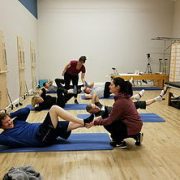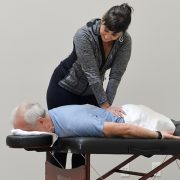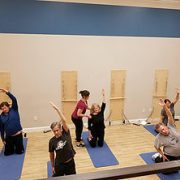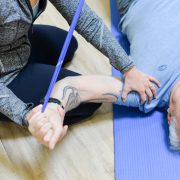Questions About Your Shoulder Pain? Here are Some Real Answers.
Often when clients come to us with shoulder pain, they’ve already tried several approaches without success. But the real issue is that everyone they’ve seen up to that point has failed to give them an accurate diagnosis.
Without an accurate diagnosis, treatment fails.
It’s not surprising. The true cause of shoulder pain is missed by many and can actually be difficult to diagnose. Sometimes it really is your shoulder, but in other cases the pain is actually caused by a problem in your neck. If there is irritation or inflammation in your neck, but someone is aggressively treating your shoulder, guess what? You aren’t going to see results and your pain may even worsen.
Here are a few questions to ask if you’re wondering if really have a shoulder problem… or if you should be getting help for your neck instead.
Where is your pain?
When you have an actual shoulder problem, the pain is always going to be just in your shoulder. The most common areas to experience pain are directly in front of your shoulder, directly on top of your shoulder, or in a more involved shoulder problem – like a rotator cuff injury – you might feel achiness on the side of your shoulder and down into the side of your arm a little. If the pain goes past your elbow, is above your shoulder and into your neck (the upper trap area), deep inside of your shoulder, or in the back into the shoulder blade, it’s entirely possible (and maybe even likely) that your neck is involved or totally responsible for your “shoulder pain.”
Do you have numbness, tingling or burning?
These are signs of nerve compression or irritation. If that’s happening in your neck – say due to a bulging disc or restricted/faulty movement patterns that irritate your nerve roots – you can feel it into your shoulder, shoulder blade, or even down into your arm.
What’s particularly misleading is that all of this nerve difficulty in the neck will only be felt in your shoulder or arm.
When do you feel stiff?
Lack of mobility and stiffness are common symptoms associated with a rotator cuff injury or the dreaded “frozen shoulder.” If your neck moves well, is pain free, and your shoulder is stiff, odds are that the problem is in your shoulder. Now, let’s say you’ve got stiffness in your neck as well as your shoulder. It’s possible the neck stiffness is a result of your shoulder not moving properly. However, you’ll never know for sure without a proper assessment. If there is even a hint of a neck issue being fully or partially responsible for your shoulder problem, it must be addressed or you will never achieve full recovery.
I do everything I’m told, why won’t my shoulder get better?
This is probably the number one sign that your shoulder problem is not really a shoulder problem at all. If you’ve had pain for months, or if you fix your pain but it keeps coming back, then there is a very good chance someone has missed something. Quite possibly, it’s a hidden neck problem. I can’t tell you how many times I’ve seen this happen. I’ve seen people try three different therapists who’ve prescribed the best rotator cuff exercises on the planet. I’ve seen people get multiple cortisone injections in their shoulder. And worse, I’ve seen people get surgery – only for their shoulder to problem return months or years later. If this sounds like you, then someone has missed the boat and your shoulder problem may not be a shoulder problem at all. You need to find a physical therapist who is a specialist and can properly assess you. They’ll know the right questions to ask, take their time doing a thorough and proper assessment, and get you on the right track to getting better.










